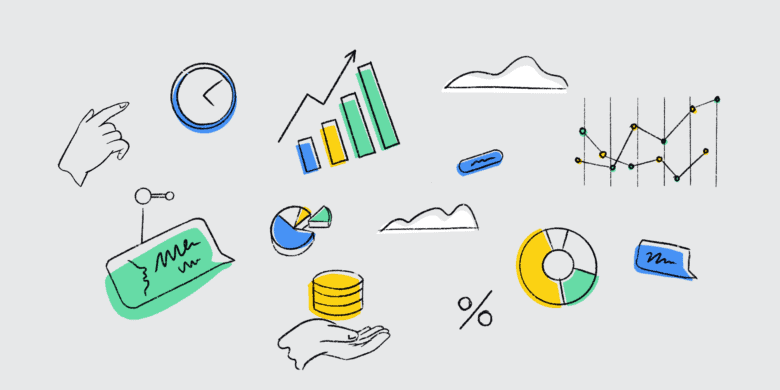Unusual employee activity tracking is a method for businesses to identify time theft, cybersecurity risks, suspicious behavior, and even the possibility of activity-fabricating tools like mouse jigglers.
If you’re not concerned about unusual activity, it could have costly consequences. The IBM Cost of a Data Breach 2024 report outlined that the average global breach cost has increased to USD 4.88 million since the pandemic.
The solution to this problem is an employee productivity monitoring software platform with built-in anomaly detection to provide oversight into modern, distributed work environments where visibility is limited.
These tracking tools surface hidden data breaches or fraudulent work behaviors that often slip through the cracks. Beyond simply flagging anomalies, productivity software is about increasing accountability while maintaining a culture of trust, transparency, and data-driven decision-making.
In this post, we’ll cover how Hubstaff helps you detect unusual activity, the benefits of monitoring unusual activity, and how to use employee performance insights to your advantage.
Boost your team’s efficiency with Hubstaff's productivity tools
What is unusual activity?
Unusual activity refers to work behavior that significantly deviates from established activity baselines. While not all unusual activity is inherently negative, it is an early signal to investigate further. As part of its time tracking software platform, Hubstaff’s Insights add-on offers built-in unusual activity monitoring.

How Hubstaff detects unusual activity
Hubstaff automatically detects unusual activity, flags it for review, and notifies managers and organization owners via email and in-app notifications to help teams take timely, informed action.
So how does it work?
Hubstaff tracks and classifies several types of anomalies, including:
- Use of false applications that simulate keyboard/mouse inputs (e.g., mouse jigglers)
- Suspicious keyboard or mouse activity patterns (e.g., repeated, rhythmic input behavior)
- Continuous work periods without meaningful breaks may indicate overwork or burnout
- Irregular activity spikes that don’t align with typical work habits
- Extended idle time during logged hours
Notifications are sent proactively within 36 hours of detection, allowing teams to resolve issues quickly and avoid the long-term risk of data compromise.
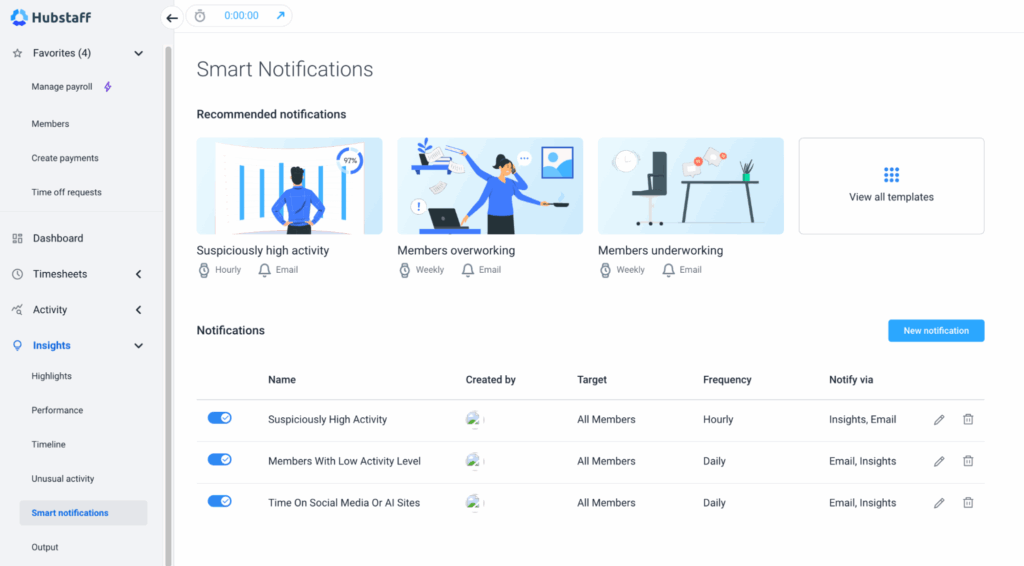
With Hubstaff’s unusual activity tracking, your team gains more than just oversight. While many tracking tools provide surface-level metrics, Hubstaff goes deeper, using behavioral benchmarks and intelligent analysis like:
- Automatic anomaly detection
- Context-rich alerts for better decision-making
- Operational transparency with employee privacy
- Preventative insights for burnout, disengagement, and inefficiency
How HR teams benefit from monitoring unusual activity
From productivity dips to time fraud and signs of burnout, unusual activity helps you detect risks early before they become bigger problems.
According to the Hubstaff Technical Leader’s Productivity Playbook, unusual activity tracking contributes to passive visibility, allowing teams to identify productivity, overwork, or automation issues early — and without the need for micromanagement.
Monitoring unusual employee activity isn’t just about detecting fraud or policy violations — it’s a strategic move for HR teams.

This insight can enhance operational efficiency, reduce compliance risks, and enable more effective workforce optimization when utilized correctly.
Here’s how HR can benefit from tracking anomalies in user behavior:
- Detect suspicious behavior like false activity from automation tools or irregular mouse/keyboard patterns.
- Get real-time Smart Notifications to respond quickly and prevent escalation.
- Spot overwork or non-compliance, such as skipped breaks or excessive hours.
- Uncover disengagement or underutilization that could signal burnout or role mismatch.
- Support strategic HR moves like policy updates, training, or retention planning.
HR teams gain deeper behavioural insights into employees by proactively monitoring unusual activity. This prevents time theft at work and builds a healthier, more compliant, and more engaged workforce.
How managers can monitor employee activity
With the right activity‑monitoring tools, managers gain strategic visibility into the productivity of remote workers — not just oversight. This drives productivity, coaching, and smarter resource allocation.
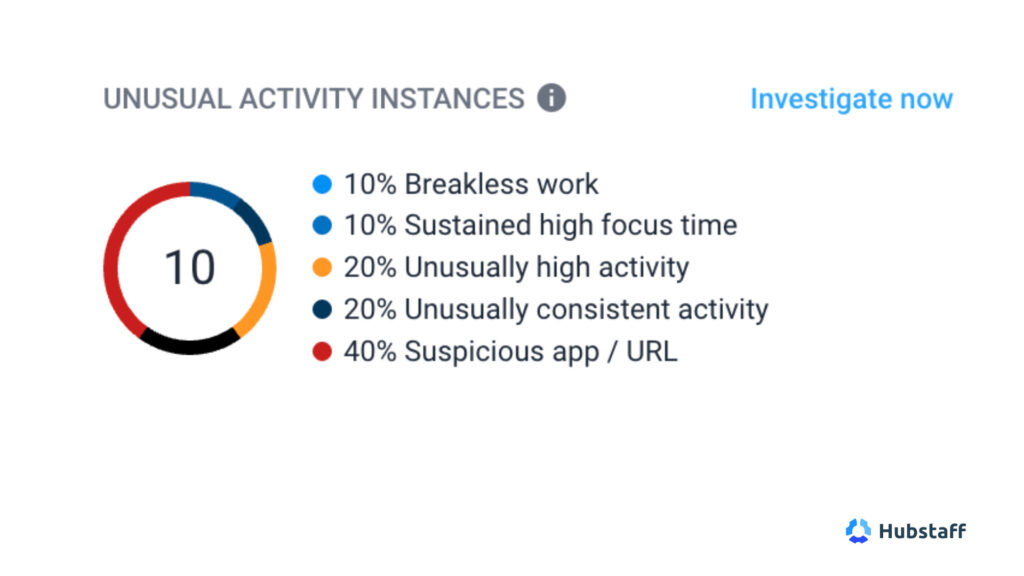
Hubstaff offers a comprehensive employee activity monitoring system that captures real-time data on how work gets done without invasive oversight, with features like:
- Activity rates based on keyboard and mouse input help benchmark engagement and detect productivity shifts.
- App and URL usage tracking provides real-time data on time spent on apps and URLs to eliminate distractions, prevent bottlenecks, and make better purchase decisions.
- Utilization rates to optimize resource allocation by identifying under or over‑utilized team members or tasks.
- Customizable settings enable organizations to blur, limit, or fully disable tracking based on their specific privacy needs and company policies.
With Hubstaff, you can identify workflow bottlenecks and delays, allowing you to adjust processes and accelerate project delivery. When work patterns shift, it’s also a great tool for spotting coaching moments. When someone’s patterns shift or performance dips, you get early signals to intervene.
With employee productivity data, decision‑making becomes more transparent and strategic. According to Hubstaff’s Workstyle Report benchmarks, across 185,000+ users, the “blended productivity” (which combines focus time and core task time) averages around 51%, giving teams a real productivity benchmark to aim for.
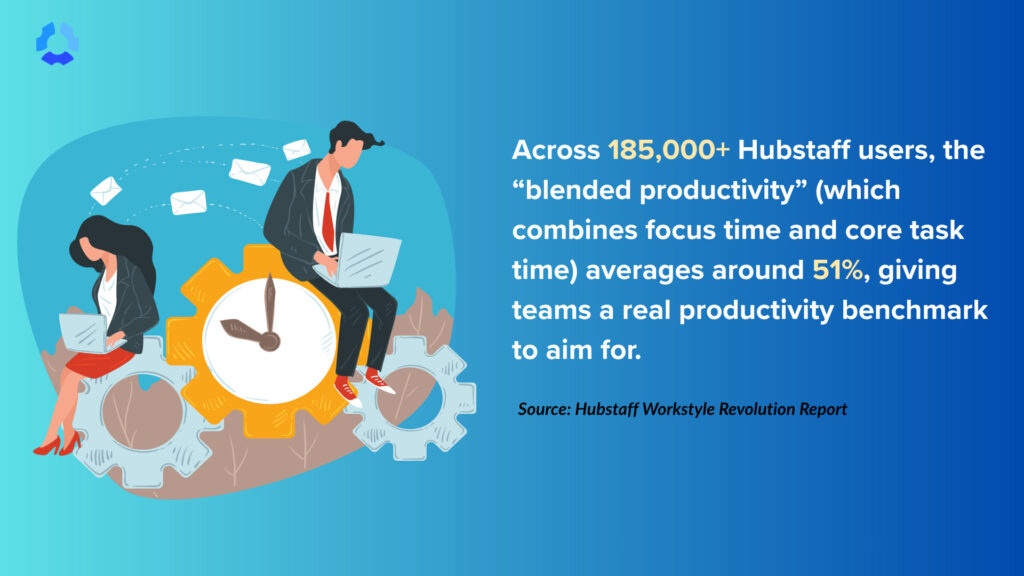
Hubstaff’s unusual activity detection ensures managers can guard against false activity, maintain accountability, and cultivate a safe, transparent working environment — all while supporting focus and performance.
How directors can use performance insights to their advantage
Directors need a clear, high-level overview of how teams perform without getting bogged down in the details. Performance insights offer strategic clarity and enable the organization to steer with data-backed confidence.
Beyond operational metrics, these insights also reveal long-term work trends and the effects of productivity tracking on employees.
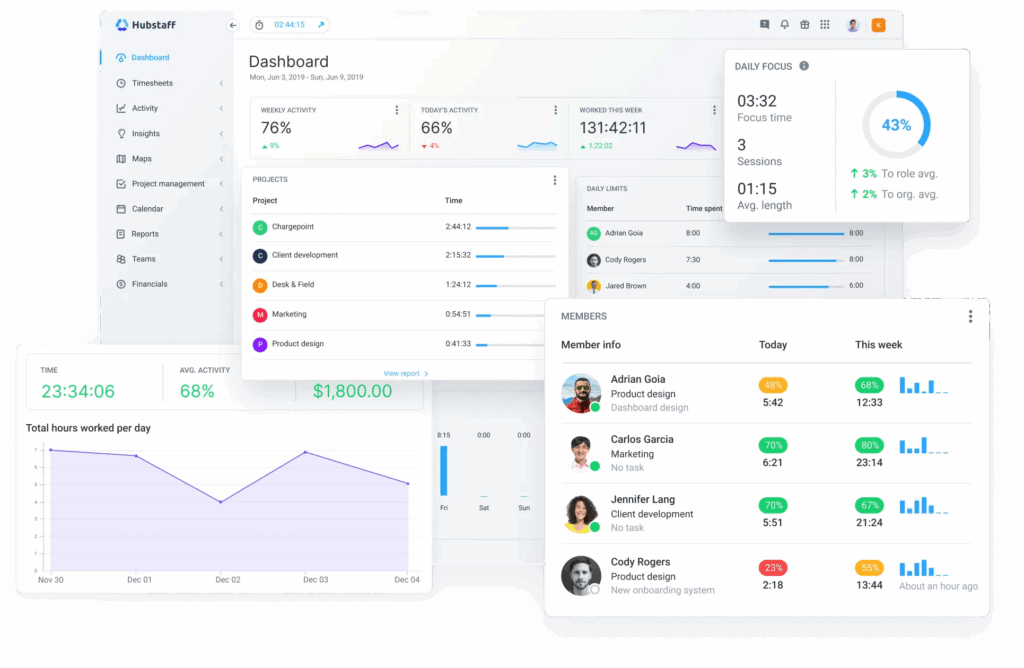
Here are a few ways directors can benefit from team performance insights:
- Access executive dashboards with key averages and benchmarks to understand performance at a glance.
- Spot trends and patterns company-wide without the need for direct oversight or micromanagement.
- Inform strategic decisions — from budgeting and hiring to process improvements — with real, behavioral data.
- Gauge team utilization to improve capacity planning, prevent burnout, and ensure each team member reaches their full potential.
With Hubstaff’s summary dashboards and cross-team visibility, directors can lead with insight, align goals across departments, and elevate operational performance without compromising team autonomy.
Safeguard your business with unusual activity monitoring
Employee activity monitoring is crucial for maintaining performance and security in a remote workforce. From frontline productivity to executive strategy, performance insights empower leaders at every level. Monitoring tools like Hubstaff don’t just track work — they help you understand it, optimize it, and make smarter decisions that fuel sustainable growth.
Want to uncover the full potential of your team? Start using performance data to drive clarity, accountability, and continuous improvement — all in one powerful platform.
Most popular
How AI Is Transforming Performance Management
Performance management has always lived in an uncomfortable space. It asks managers to measure things that are often hard to see �...
What’s New at Hubstaff: Product Updates & Feature Announcements
Whether you’re leading a high-velocity tech team, outsourcing global talent, or running a fast-paced agency, the underlying...
Top Employee Monitoring Software for Mac: 2025 Guide
Hey, Mac enthusiasts! Are you feeling a little lost in the complex world of employee monitoring software —especially when lookin...
6 Signs Your Employees Can Tell They’re Being Monitored at Work
Noticing unfamiliar software, restricted access, or slower internet? These might be signs you are being monitored at work. I...


